Trojan.Win32.Bazon.a (Tutorial) - Free Guide
Trojan.Win32.Bazon.a Removal Guide
What is Trojan.Win32.Bazon.a?
Trojan.Win32.Bazon.a is the detection name indicating that the machine has an intruder running in the background
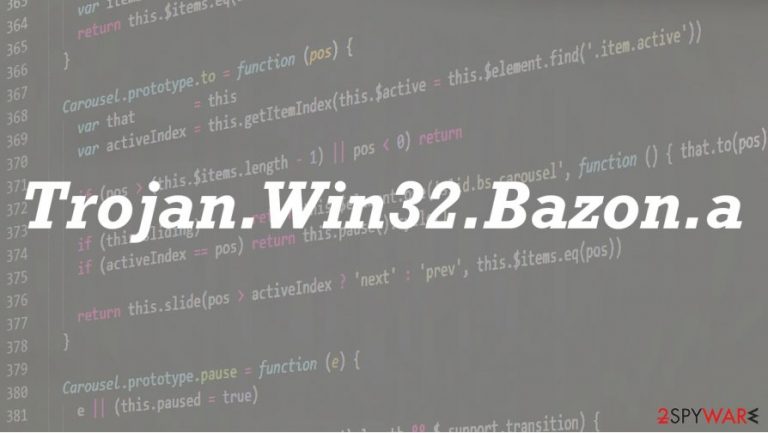
Trojan.Win32.Bazon.a – a malicious program that can be set to affect an infected machine significantly. Trojan may be designed to steal data or infiltrate other viruses on the machine. You need to pay attention to such heuristic detections[1] and search for other symptoms that can indicate a serious infection. You might notice speed issues, performance problems, and other things that keep you questioning the security state. Do not hesitate and clear the machine because these infections can damage your device significantly without your knowledge.
| Name | Trojan.Win32.Bazon.a |
|---|---|
| Type | Trojan |
| Issues | The malware can be set to steal data, damage the machine, or infiltrate other programs on the PC that damage the machine |
| Distribution | This virus can spread using malicious files[2] or links to hacked pages. There are various other programs that can lead to infiltration of this intruder |
| Elimination | You need to remove Trojan.Win32.Bazon.a properly. Unfortunately, it is not that easy, so rely on anti-malware tools for the job |
| Repair | Trojans can trigger serious changes on the machine, so repair the damage using FortectIntego or a similar tool |
Trojan.Win32.Bazon.a is the threat that can stealthily infiltrate the system and triggers needed changes on the computer. It can happen pretty quickly, so the user who gets the infection cannot notice any changes or indicate the intruder before particular symptoms get triggered.
You can possibly indicate that the virus is running on your system if you find the PC running slower than usual or occasional crashes out of nowhere. Also, processes running the background and poor performance of particular applications can raise some questions about infections like Trojan.Win32.Bazon.a virus.
The most important thing that you need to note is that various malware like Trojan.Win32.Bazon.a can launch processes, install files and trigger downloads, direct installations of malicious programs on your device. Experts[3] inform that trojans can be set to:
- steal data from the machine;
- install payload of ransomware;
- open backdoors for malicious actors;
- give access to your PC for a hacker;
- mine cryptocurrency while using the resources of the machine.
Most of these activities can cause slowness and changed performance quality, so you can notice the infection and remove Trojan.Win32.Bazon.a sooner. The best way to do so would be with anti-malware tools like SpyHunter 5Combo Cleaner or Malwarebytes. You should check the machine and get rid of the virus, especially when your AV tool already indicates the infection.

When you are sure that you want to remove Trojan.Win32.Bazon.a and can do that with a program of your choice, double-check to be 100 percent sure. If not, you might risk getting your system infected again. Also, remember about virus damage and system alterations that threat like this can cause, so rely on FortectIntego for the repair.
Phishing scams, hacked sites, and malicious copies of files deliver trojans silently
You can be sure that you are visiting safe sites and using proper software, but there are various methods that virus creators can still rely on. Of course, malicious program installations, torrent sites, pirating, and similar platforms trigger unwanted infiltration of PUPs, other threats. However, more dangerous malware has its own ways.
In most cases, trojans, worms, ransomware, other malware rely on more intrusive, silent techniques. Most of them rely on malicious files that can be delivered via email as an attachment or a link to a site that automatically triggers the download.
Of course, the worst thing is that you do not know when it happens or cannot spot the threat during the installation. These malicious files can come as executables or documents, PDFs, so the best way to avoid infiltration is NOT opening shady emails at all.
You need to properly terminate Trojan.Win32.Bazon.a virus to make sure that the damage is repaired
Trojan.Win32.Bazon.a removal procedures and success depend on the time this malware managed to run on your device for. It is possible that the detection appeared on the screen before any other processes got triggered, so you can delete the virus with a program that showed you the alert. If you need other alternatives for security tools or anti-malware, try SpyHunter 5Combo Cleaner or Malwarebytes.
As we always mention, when it comes to trojans and other more stealthy malware, viruses, worms, you need help to eliminate them. The best way to remove Trojan.Win32.Bazon.a is by running an anti-malware tool and a full scan with it. It is because your app finds and deletes every piece of a malicious intruder. However, there are pieces that get damaged by the threat directly. For such damage fix – run FortectIntego.
Getting rid of Trojan.Win32.Bazon.a. Follow these steps
Manual removal using Safe Mode
Rebooting machine in Safe Mode with Networking helps with proper Trojan.Win32.Bazon.a removal
Important! →
Manual removal guide might be too complicated for regular computer users. It requires advanced IT knowledge to be performed correctly (if vital system files are removed or damaged, it might result in full Windows compromise), and it also might take hours to complete. Therefore, we highly advise using the automatic method provided above instead.
Step 1. Access Safe Mode with Networking
Manual malware removal should be best performed in the Safe Mode environment.
Windows 7 / Vista / XP
- Click Start > Shutdown > Restart > OK.
- When your computer becomes active, start pressing F8 button (if that does not work, try F2, F12, Del, etc. – it all depends on your motherboard model) multiple times until you see the Advanced Boot Options window.
- Select Safe Mode with Networking from the list.
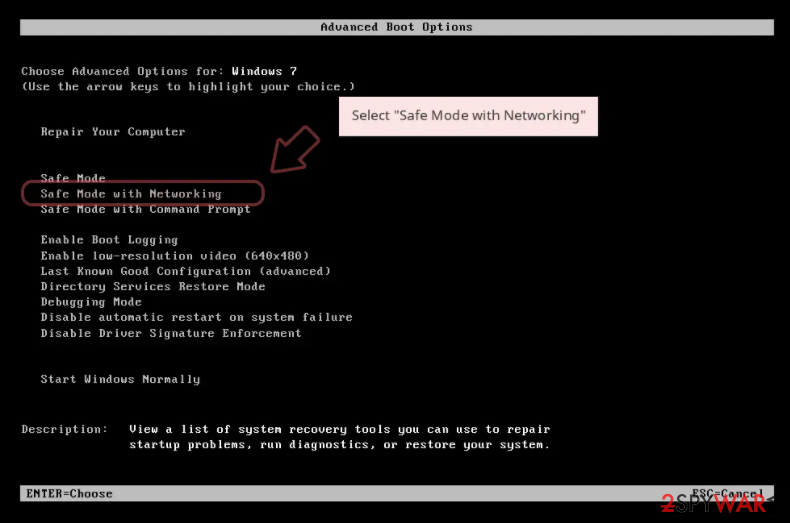
Windows 10 / Windows 8
- Right-click on Start button and select Settings.
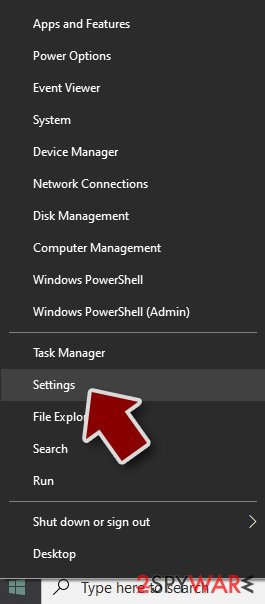
- Scroll down to pick Update & Security.
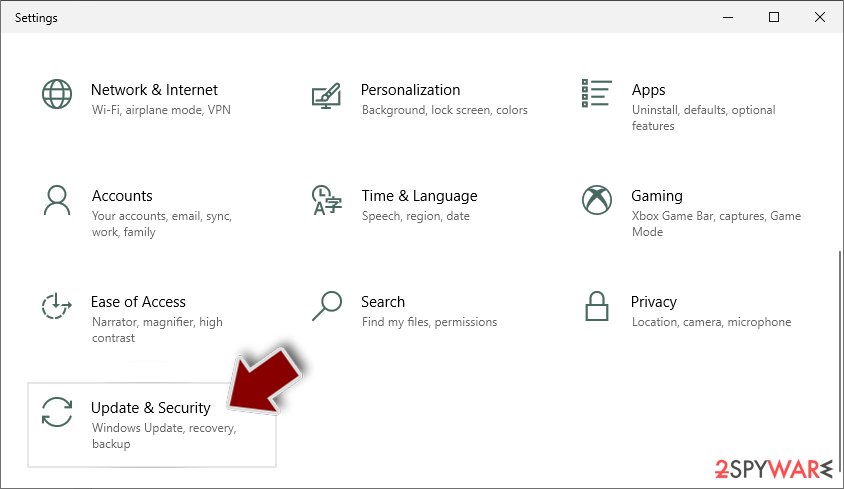
- On the left side of the window, pick Recovery.
- Now scroll down to find Advanced Startup section.
- Click Restart now.
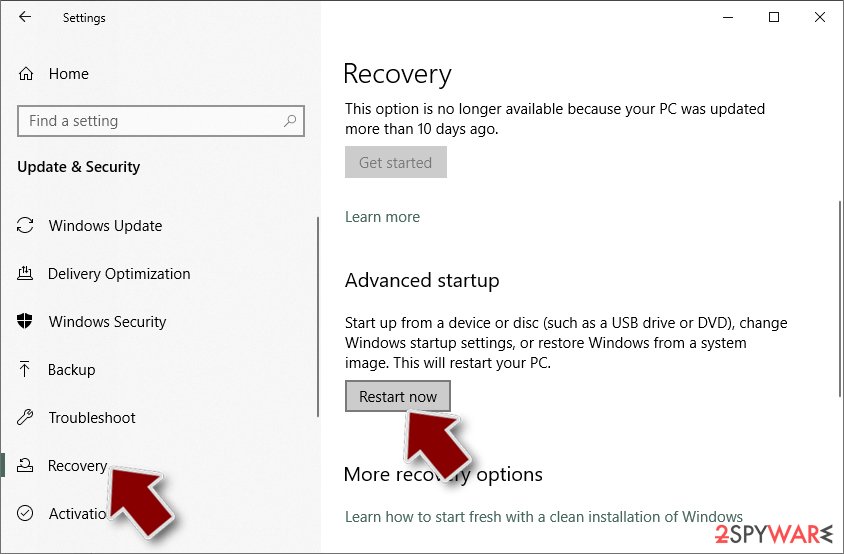
- Select Troubleshoot.
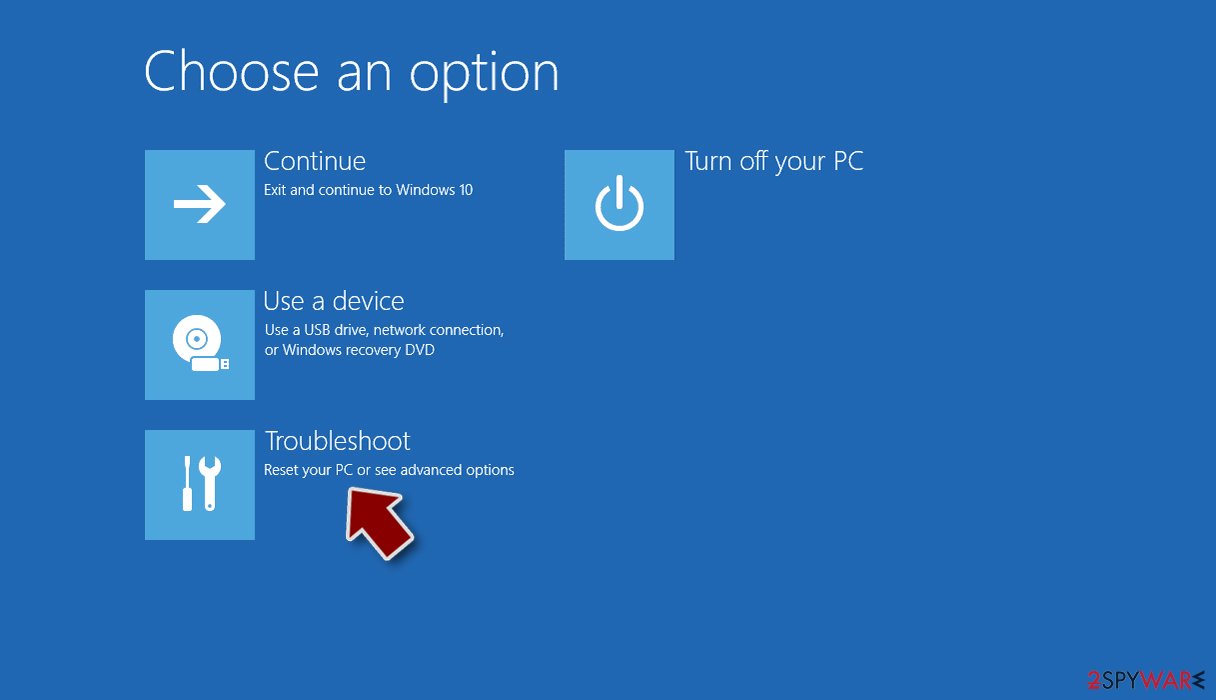
- Go to Advanced options.
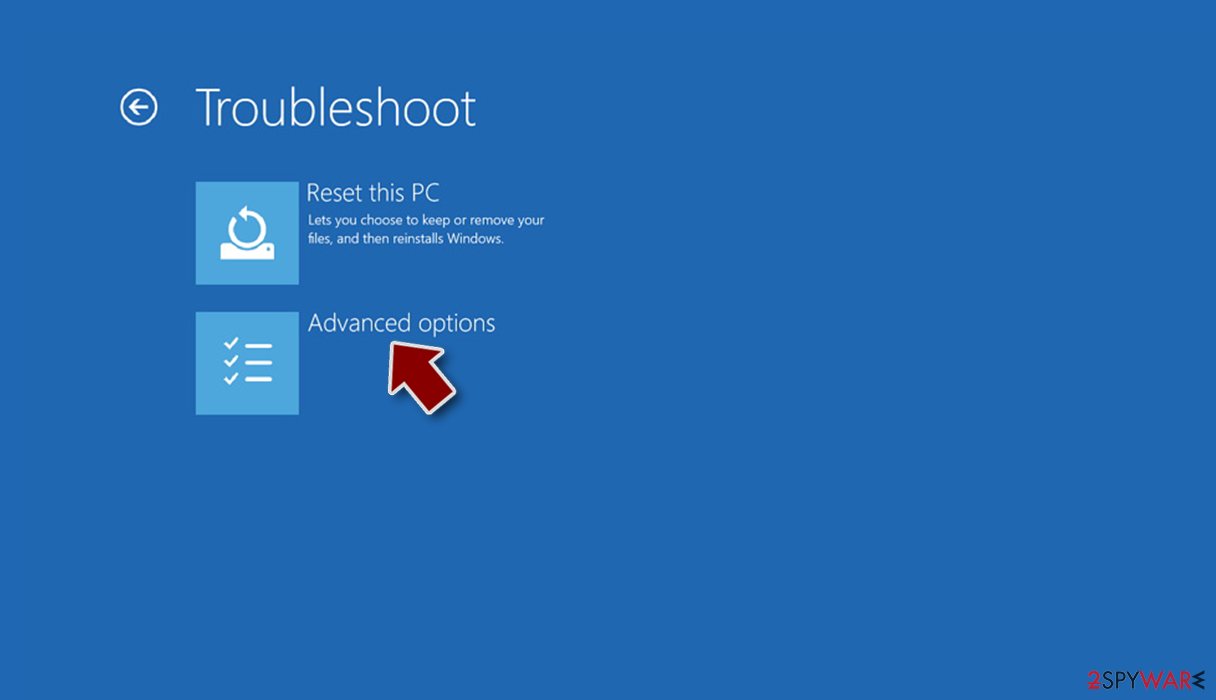
- Select Startup Settings.
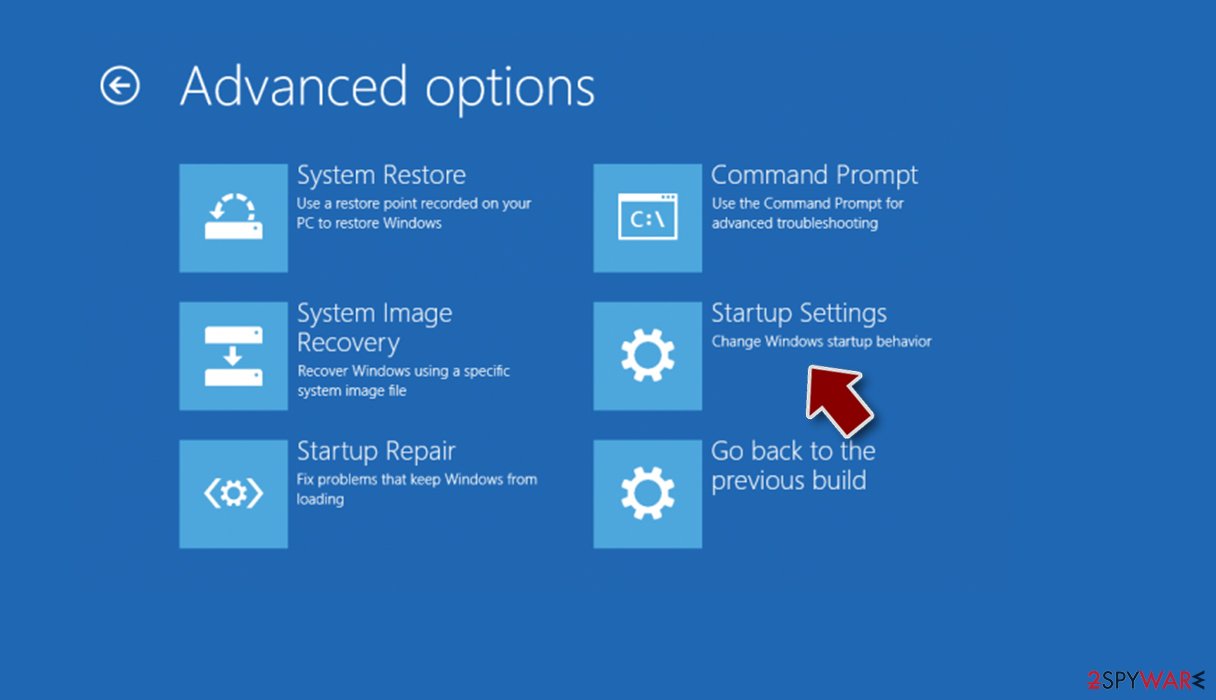
- Press Restart.
- Now press 5 or click 5) Enable Safe Mode with Networking.
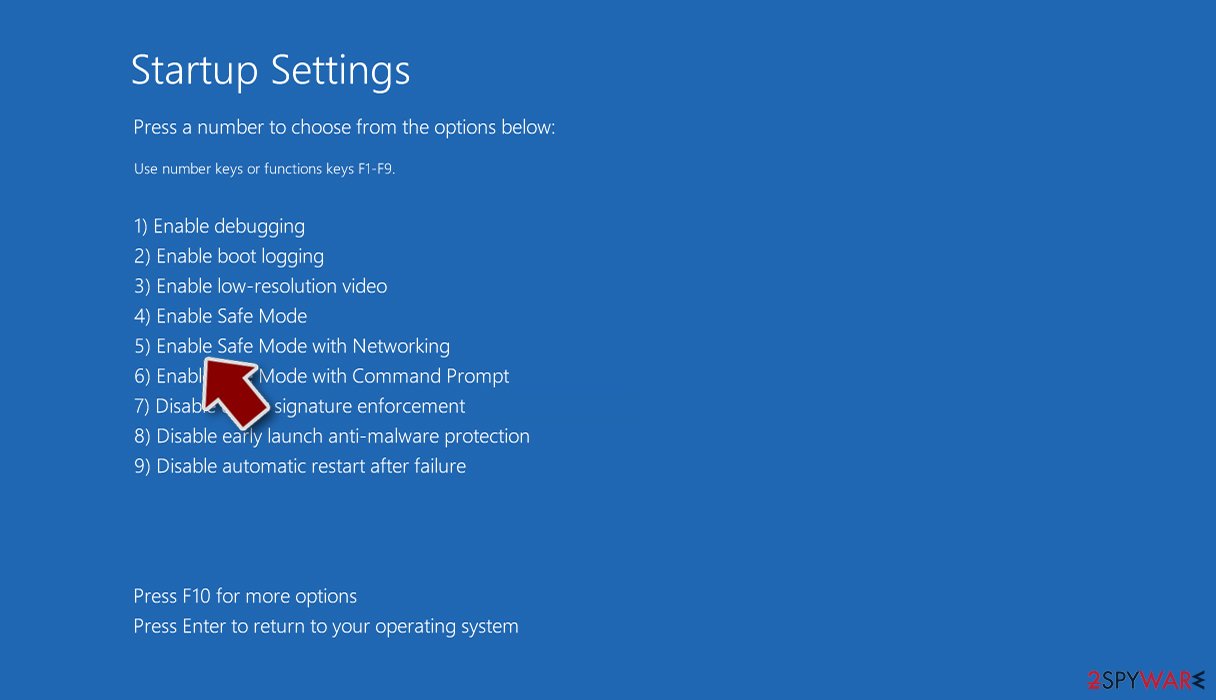
Step 2. Shut down suspicious processes
Windows Task Manager is a useful tool that shows all the processes running in the background. If malware is running a process, you need to shut it down:
- Press Ctrl + Shift + Esc on your keyboard to open Windows Task Manager.
- Click on More details.
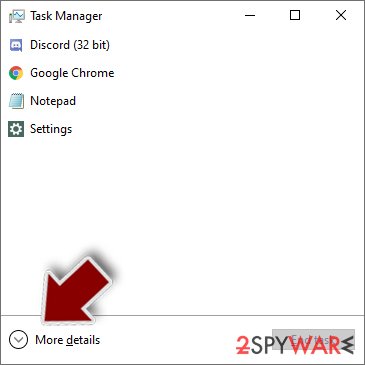
- Scroll down to Background processes section, and look for anything suspicious.
- Right-click and select Open file location.
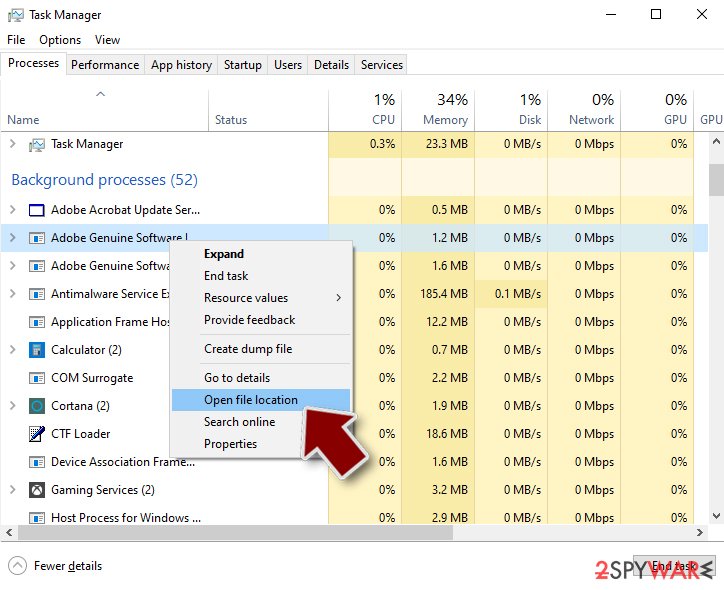
- Go back to the process, right-click and pick End Task.
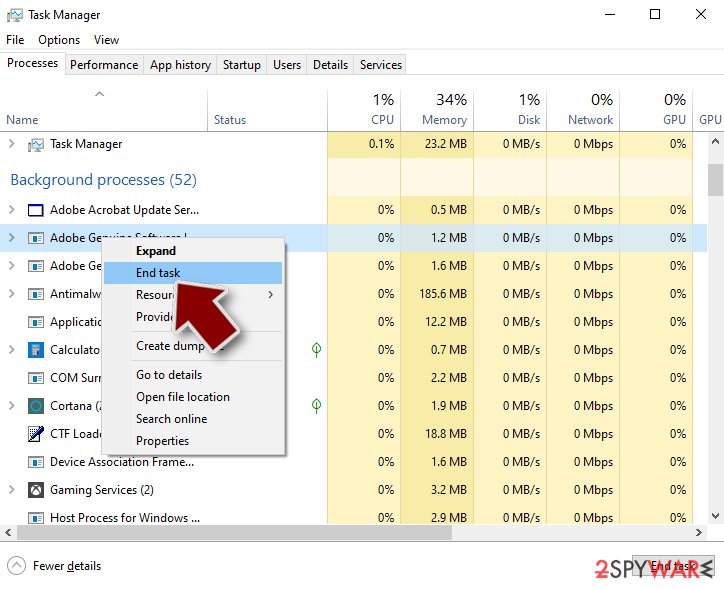
- Delete the contents of the malicious folder.
Step 3. Check program Startup
- Press Ctrl + Shift + Esc on your keyboard to open Windows Task Manager.
- Go to Startup tab.
- Right-click on the suspicious program and pick Disable.
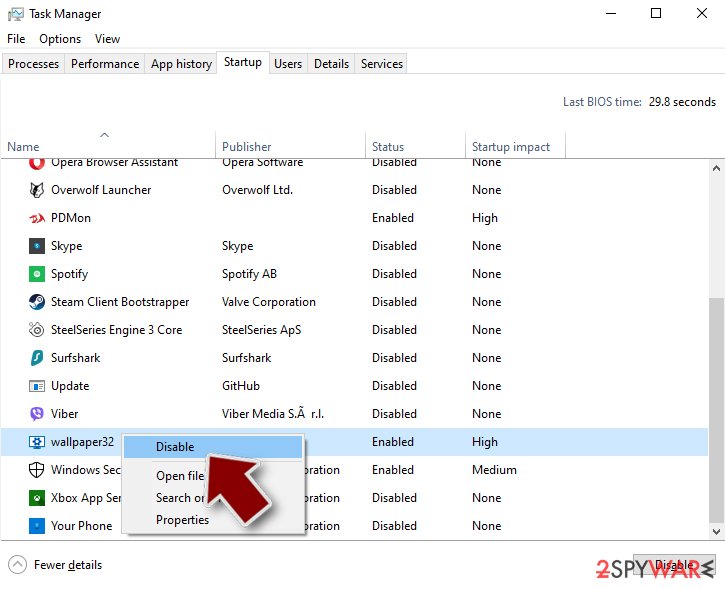
Step 4. Delete virus files
Malware-related files can be found in various places within your computer. Here are instructions that could help you find them:
- Type in Disk Cleanup in Windows search and press Enter.
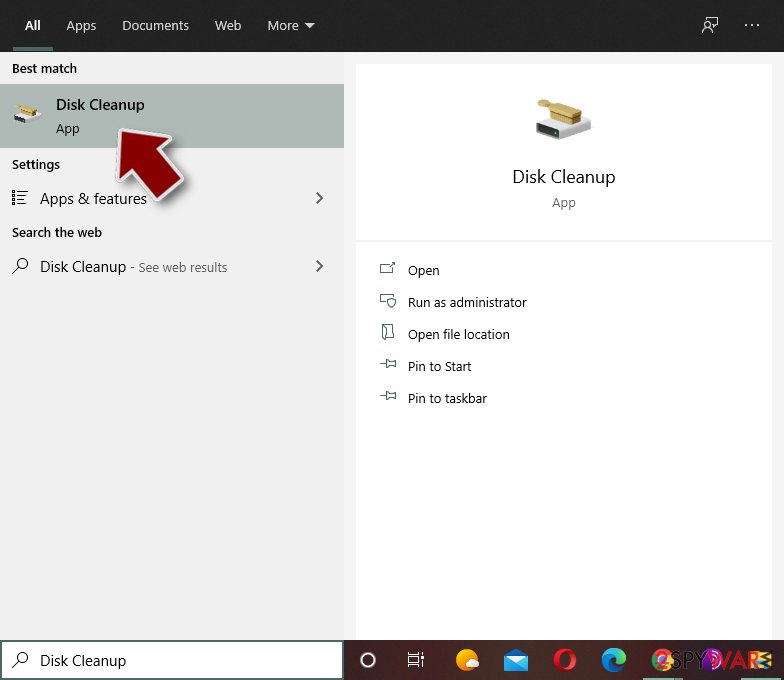
- Select the drive you want to clean (C: is your main drive by default and is likely to be the one that has malicious files in).
- Scroll through the Files to delete list and select the following:
Temporary Internet Files
Downloads
Recycle Bin
Temporary files - Pick Clean up system files.
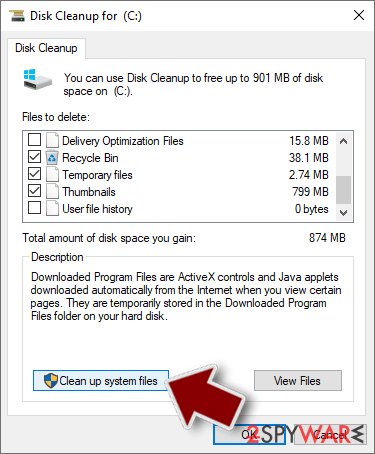
- You can also look for other malicious files hidden in the following folders (type these entries in Windows Search and press Enter):
%AppData%
%LocalAppData%
%ProgramData%
%WinDir%
After you are finished, reboot the PC in normal mode.
Remove Trojan.Win32.Bazon.a using System Restore
The System restore feature can give you the opportunity to recover PC before the virus was active
-
Step 1: Reboot your computer to Safe Mode with Command Prompt
Windows 7 / Vista / XP- Click Start → Shutdown → Restart → OK.
- When your computer becomes active, start pressing F8 multiple times until you see the Advanced Boot Options window.
-
Select Command Prompt from the list

Windows 10 / Windows 8- Press the Power button at the Windows login screen. Now press and hold Shift, which is on your keyboard, and click Restart..
- Now select Troubleshoot → Advanced options → Startup Settings and finally press Restart.
-
Once your computer becomes active, select Enable Safe Mode with Command Prompt in Startup Settings window.

-
Step 2: Restore your system files and settings
-
Once the Command Prompt window shows up, enter cd restore and click Enter.

-
Now type rstrui.exe and press Enter again..

-
When a new window shows up, click Next and select your restore point that is prior the infiltration of Trojan.Win32.Bazon.a. After doing that, click Next.


-
Now click Yes to start system restore.

-
Once the Command Prompt window shows up, enter cd restore and click Enter.
Finally, you should always think about the protection of crypto-ransomwares. In order to protect your computer from Trojan.Win32.Bazon.a and other ransomwares, use a reputable anti-spyware, such as FortectIntego, SpyHunter 5Combo Cleaner or Malwarebytes
How to prevent from getting trojans
Access your website securely from any location
When you work on the domain, site, blog, or different project that requires constant management, content creation, or coding, you may need to connect to the server and content management service more often. The best solution for creating a tighter network could be a dedicated/fixed IP address.
If you make your IP address static and set to your device, you can connect to the CMS from any location and do not create any additional issues for the server or network manager that needs to monitor connections and activities. VPN software providers like Private Internet Access can help you with such settings and offer the option to control the online reputation and manage projects easily from any part of the world.
Recover files after data-affecting malware attacks
While much of the data can be accidentally deleted due to various reasons, malware is one of the main culprits that can cause loss of pictures, documents, videos, and other important files. More serious malware infections lead to significant data loss when your documents, system files, and images get encrypted. In particular, ransomware is is a type of malware that focuses on such functions, so your files become useless without an ability to access them.
Even though there is little to no possibility to recover after file-locking threats, some applications have features for data recovery in the system. In some cases, Data Recovery Pro can also help to recover at least some portion of your data after data-locking virus infection or general cyber infection.
- ^ Trojan Bazon Detected by Kaspersky. Steamcommunity. Forum.
- ^ Malicious macros. Wikipedia. The free encyclopedia.
- ^ Virusai. Virusai. Spyware related news.







